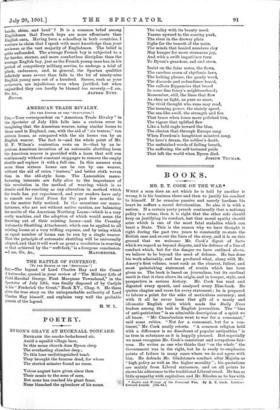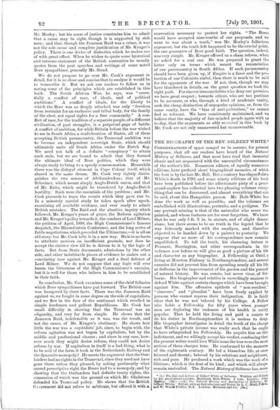BOOKS.
MR. E. T. COOK ON THE WAR.*
WHEN a man does an act which he is told by another is wrong it is his business there and then to justify his conduct to himself. If he remains passive and merely hardens his heart he suffers a moral deterioration. So also it is with a nation. If a certain party preach continually that a national policy is a crime, then it is right that the other side should keep on justifying its conduct, lest that moral apathy should arise which is one of the most fatal maladies which can beset a State. This is the reason why we have thought it right during the past two years to constantly re-state the British case and re-cut the lines of the story, and it is on this ground that we welcome Mr. Cook's digest of facts which we regard as beyond dispute, and his defence of a line of conduct which, but for the danger we have outlined above, we believe to be beyond the need of defence. He has done his work admirably, and has produced what, along with Mr, Amery's first volume, must rank as the clearest, fullest, and most painstaking statement of events which has been given us. The book is based on journalism, but its cardinal merit is that it rises above its origin, and in temper, style, and perspective is serious history. Mr. Cook has read and digested every speech, and analysed every Blue-book. He quotes chapter and verse for every statement; he is prepared to labour a point for the sake of meticulous accuracy; and with it all he never loses that gift of a manly and idiomatic English style which made the Daily News leaders among the beet in English journalism. The "bias of anti-patriotism" is an admirable description of a spirit we all know. "Mr, Chamberlain went to war for a consonant," said some critics. "Not for a consonant, but for a con- tinent," Mr. Cook neatly retorts. "A common religion held with a difference is no dissolvent of popular antipathies" is as true in substance as it is happily phrased. But especially we must recognise Mr. Cook's consistent and scrupulous fair- ness. He writes as one who thinks that "on the whole" the Government was in the right, but he is ready to emphasise points of failure in many cases where we do not agree with him. He defends Mr. Gladstone's conduct after Majuba as "high policy as well as the higher morality " ; his quotations are mainly from Liberal statesmen, and on all points he shows his adherence to the traditional Liberal creed. He has as little sympathy with capitalism and Mr. Rhodes as he has with * Rights and Wrongs of the Transvaal War, By E. T. Cook. London : Edward Arnold. [12a. 6d1
Mr. Morley; but his sense of justice constrains him to admit that a cause may be right, though it is supported by rich men; and that, though the Jameson Raid was a crime, it was not the sole cause and complete justification of Mr. Kruger's policy. There is one device of dialectics which he makes use of with great effect. When he wishes to quote some hysterical and extreme statement of the British contention he usually quotes from the past speeches and writings of some noted Boer sympathiser, generally Mr. Stead.
We do not propose to go over Mr. Cook's argument in detail, for it is so close and concise that to analyse it would be to transcribe it. But we ask our readers to follow us in noting some of the principles which are established in this book. The South African War, he says, was "essen- tially a conflict of race, of ideals, and of political ambitions." A conflict of ideals, for the liberty to which the Boer was so deeply attached was only "freedom from restraint for an exclusive and tribal body, for the family of the elect, not equal rights for a free community." A con- flict of race, for the tradition of a separate people, of a different civilisation, of past struggles, is a perpetual gage of battle. A conflict of ambition, for while Britain before the war wished to see in South Africa a confederation of States, all of them accepting British paramountcy, the Transvaal ambition was to become an independent sovereign State, which should ultimately unite all South Africa under the Dutch flag. We need not talk of a definite " conspiracy " to attain such ends, but we are bound to admit that they formed the ultimate ideal of Boer politics, which they were always ready to bring to a speedy consummation. Meanwhile there was the disloyal element in Cape Colony itself, which shared in the same dream. Mr. Cook very rightly distin- guishes the two senses of Afrikanderdom ; that of Mr. Schreiner, which meant simply Anglo-Dutch union, and that of Mr. Reitz, which might be translated by Anglo-Dutch hostility. Such were the essentials of the problem ; and Mr. Cook proceeds to trace the events which they gave rise to. In a minutely careful study he takes epoch after epoch, examining all available evidence, and ever ready to admit British mistakes. The Raid and the abortive inquiry which followed, Mr. Kruger's years of grace, the Reform agitation and Mr. Kruger's policy towards it, the conduct of Lord Milner, the petition of April, 1899, the High Commissioner's famous despatch, the Bloemfontein Conference, and the long series of futile negotiations which preceded the .Ultimatum,—it is all an old story, but Mr. Cook tells it in a new way. He is in no haste to attribute motives on insufficient grounds, nor does he accept the sinister view till he is driven to it by the logic of facts. But from State documents, admissions by the other side, and other indubitable pieces of evidence he makes out a convincing case against Mr. Kruger and a final defence of Lord Milner. We do not suppose that any logic will ever lessen the bitterness of the High Commissioner's enemies, but it is well for those who believe in him to be established in their faith.
In conclusion, Mr. Cook examines some of the chief fallacies which Boer sympathisers have put forward. The British case was hampered by three facts. There was the Jameson Raid against us, we fought in some degree on the side of capitalists, and we flew in the face of the sentiment which revelled in simple herdsmen and gallant Republicans. Mr. Cook has small difficulty in showing that the Transvaal was an oligarchy, and very far from simple. He shows that the Jameson Raid, indefensible as it was, was the result, and not the cause, of Mr. Kruger's obstinacy. He shows how little the war was a capitalists' job, since, to begin with, the reform agitation was not begun by capitalists, but by the middle and professional classes ; and since in any case, how- ever much they might desire reform, they could not desire reform by war. If capitalism in itself is a bad thing, what is to be said of the form it took in the Netherlands Railway and the dynamite monopoly? He meets the argument that the Out- landers had no rights in the Transvaal, since they need not have gone there unless they pleased, by asking pertinently what sacred prescriptive right the Boers had to a monopoly, and by showing that the Outlanders had definite treaty rights, the concession of which was the ground on which Mr. Gladstone defended his Transvaal policy. He shows that the British overnment did not refuse to arbitrate, but offered it with a
reservation necessary to protect her rights. "The Boers would have accepted nine-tenths of our proposals, and we went to war about a tenth," was Mr. Morley's fallacious argument, but the tenth left happened to be the crucial point, the one guarantee of Boer good faith. The question, indeed, was very simple. Mr. Kruger offered us a sham reform, when we asked for a real one. He was prepared to grant the latter only on terms which meant the renunciation of our paramountcy in South Africa. If such paramountcy should have been given up, if Empire is a farce and the pro. tection of our Colonists sinful, then there is much to be said for the opponents of the war. If not, then, though we may have blundered in details, on the great question we took the right path. For sincere irreconcilables who deny our premises we have great respect ; towards others, who are too partisan to be accurate, or who, through a kind of academic vanity, seek the cheap distinction of unpopular opinions, or, from the same vanity, have the "bias of anti-patriotism," we cannot feel so tolerant. We have consistently maintained, and we believe that the majority of fair-minded people agree with us to-day, that the arguments so ably re-stated in this book by Mr. Cook are not only unanswered but unanswerable.



































 Previous page
Previous page